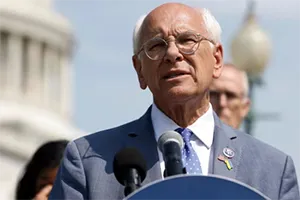 Paul David Tonko, the US Representative for New York’s 20th congressional district, has introduced a sports betting bill, also known as the SAFE Bet Act at a news conference held in Washington on Tuesday. The proposal for the new federal law is a product of the cooperation between the politician and representatives from Northeastern’s Public Health Advocacy Institute.
Paul David Tonko, the US Representative for New York’s 20th congressional district, has introduced a sports betting bill, also known as the SAFE Bet Act at a news conference held in Washington on Tuesday. The proposal for the new federal law is a product of the cooperation between the politician and representatives from Northeastern’s Public Health Advocacy Institute.
If passed, the bill would impose limitations on the way remote sports betting operators market their products to consumers in the US. Tonko commented on the sports betting industry’s hectic pace of expansion: “We are dealing with a massive and growing public health crisis involving a known, addictive product.”
The democratic politician’s SAFE Bet Act aims to limit specific aspects of sports betting companies’ advertising and marketing campaigns. To begin with, advertisements of sports betting operators during live sports events would be prohibited. Betting companies would also be banned from using specific wording, such as “bonus” and “No sweat” bets in their ads.
Furthermore, deposits via credit cards would no longer be possible. Bookies would be subjected to yet another limitation, requiring them to accept no more than 5 deposits per customer within 24 hours. AI tools, used to monitor bettors’ gambling habits and suggest tailor-made prop bets, would also be banned.
While speaking at the news conference, Tonko defined sportsbooks’ advertising and marketing campaigns as “predatory”, a stance he has been firmly advocating through his Betting on Our Futures Act introduced last year.
Ultimately, the bill would introduce mechanisms designed to protect customers from gambling-related harm, especially in a sports betting era driven by advanced technologies.
The SAFE Bet Act Is Prepared in Collaboration with Reps of Northeastern’s Public Health Advocacy Institute
 Representatives of Northeastern’s Public Health Advocacy Institute, spearheaded by US lawyer Richard Daynard, joined Paul Tonko while he presented the bill at the conference. Professor Daynard is widely recognized for his contributions to public health law and his successful lawsuit during the 1990s against the tobacco industry, leading to bans on secondhand smoke in public areas. He also spoke at the conference, specifically highlighting the role of artificial intelligence in the sports betting industry and the way it has come to reshape it.
Representatives of Northeastern’s Public Health Advocacy Institute, spearheaded by US lawyer Richard Daynard, joined Paul Tonko while he presented the bill at the conference. Professor Daynard is widely recognized for his contributions to public health law and his successful lawsuit during the 1990s against the tobacco industry, leading to bans on secondhand smoke in public areas. He also spoke at the conference, specifically highlighting the role of artificial intelligence in the sports betting industry and the way it has come to reshape it.
The law professor, along with Mark Gottlieb, Executive Director of the Public Health Advocacy Institute, and Harry Levant, an internationally certified gambling counselor and Gambling Policy Adviser at the institute, have been closely collaborating with Paul Tonko to devise the federal piece of law that interprets gambling as “a public health issue”, similarly to alcohol and tobacco.
Harry Levant, on the other hand, expressed his hopes that the sports world would back their efforts to “make gambling on sports as safe as possible.” He further noted that, unlike other popular gambling jurisdictions, such as the UK and Australia, there had never been a study, shedding light on the public harm associated with the ever-growing expansion of gambling in the US. Levant added that these jurisdictions “have found that approximately 15% of the general public suffers gambling-related harm on an annual basis.”